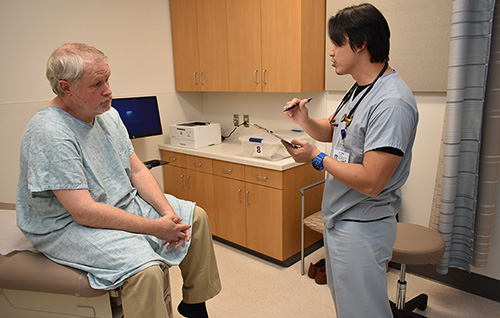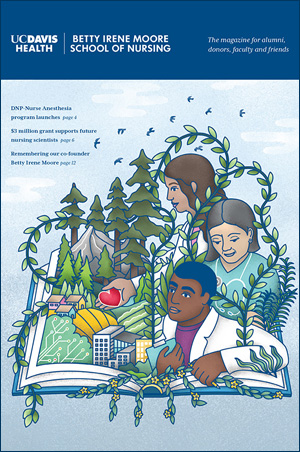Preparing physician assistants as change agents
The future of health care is undefined. Health care needs professionals who want to have a greater impact — people who believe there is a better way. Primary care is the place to lead this change.
Primary care providers lead change at the ground floor as they meet people who need care, form relationships with both patients and health care teams, and truly improve the health of communities and populations where it’s needed most.
Physician assistants (P.A.s) are uniquely positioned to ignite bold change in health care. The P.A. profession is No. 3 in the U.S. News & World Report Top 100 Best Jobs and No. 2 in the Top 100 Best Health Care Jobs. The Master of Health Services — Physician Assistant Studies Degree Program at the Betty Irene Moore School of Nursing focuses on the preparation of new P.A.s for this ever-changing health care workforce.

Physician assistant students learn to communicate with and care for patients in our Primary Care Simulation Suite in Betty Irene Moore Hall. Here, a student takes a patient history from a standardized patient, actors who play specific patient roles in simulation exercises.
“Students who are interested in changing health care for the better and being leaders in these efforts will find our program aligns with their vision,” said Jeffrey Pearl, a physician and director of the P.A. program.
With its specialty focus on family medicine, underserved communities and rural health, the UC Davis P.A. program infuses leadership, interprofessional education and student support so its graduates excel in school and their future careers.
Graduates of the P.A. program have the skills, confidence and vision to be agents of change on many levels. They gain critical thinking, clinical excellence and deep understanding of health care systems that prepares them to flourish in practice. They are prepared as leaders to advance health locally, national and globally in ways that address inequities, big and small, that stand in the way of optimal health and health care equity for all.
The UC Davis P.A. program is also distinctive for the unique learning opportunities provided students here on the UC Davis Sacramento campus, which includes the Betty Irene Moore School of Nursing, the UC Davis School of Medicine and the UC Davis Medical Center. This academic health center is a hub of innovation where students, trainees, faculty and staff from nearly 100-post graduate majors bring unique and creative approaches to health care.
“We have a robust network of student-run clinics at UC Davis Health where P.A. students may begin early in their training, often in their first year,” Pearl added. “Our extensive use of simulation and standardized patient programs augment clinical education and consolidate classroom learning into real-life application.”
In the second year of the 27-month program, future P.A.s complete several four-to-six-week clinic rotations throughout California. These experiences are at large health systems, like UC Davis Health, or small, community-based clinics in underserved and rural areas. Students are not required to provide or solicit clinical sites or preceptors. Primary care is an essential component of these rotations along with a variety of specialty care as well, including pediatrics, women’s health, psychiatry, emergency medicine, surgery and inpatient medicine.
“For me, what makes being a P.A. so awesome is versatility,” said Teresa Thetford, a P.A. and assistant program director. “Because of the P.A. education model, P.A.s have clinical rotations in all areas of medicine and the national board exam covers all body organ systems. Therefore, a P.A. can easily change from one specialty to another without additional formal education.”
Whether in classroom or in clinical practice, Pearl said students are supported by an interprofessional team of faculty from disciplines including medicine, nursing, health informatics, nutrition, biostatistics, pharmacy, sociology and public health.
“Our students’ success is our success,” he said. “We are always striving to adjust and make better the program using student feedback, outcomes and years of experience form this diverse group of faculty.”





